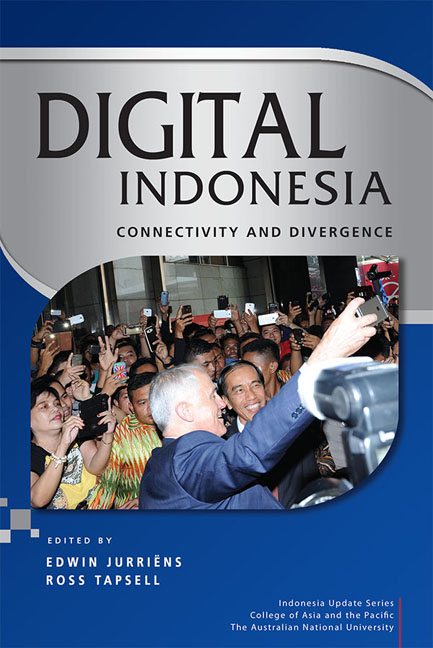Book contents
- Frontmatter
- Contents
- Tables
- Figures
- Contributors
- Acknowledgments
- Glossary
- Map of Indonesia
- 1 Challenges and opportunities of the digital ‘revolution’ in Indonesia
- PART 1 CONNECTIVITY
- PART 2 DIVERGENCE
- PART 3 IDENTITY
- PART 4 KNOWLEDGE
- 11 Digitalising knowledge: education, libraries, archives
- 12 Digital art: hacktivism and social engagement
- PART 5 COMMERCE
- Index
- Indonesia Update Series
11 - Digitalising knowledge: education, libraries, archives
from PART 4 - KNOWLEDGE
Published online by Cambridge University Press: 12 January 2018
- Frontmatter
- Contents
- Tables
- Figures
- Contributors
- Acknowledgments
- Glossary
- Map of Indonesia
- 1 Challenges and opportunities of the digital ‘revolution’ in Indonesia
- PART 1 CONNECTIVITY
- PART 2 DIVERGENCE
- PART 3 IDENTITY
- PART 4 KNOWLEDGE
- 11 Digitalising knowledge: education, libraries, archives
- 12 Digital art: hacktivism and social engagement
- PART 5 COMMERCE
- Index
- Indonesia Update Series
Summary
This chapter presents an overview of the digitalisation of knowledge, specifically in relation to education, libraries and archives in Indonesia. After providing background on the broader academic field to which this study relates, I demonstrate how the tropical, humid climatic conditions of the archipelago, and the historical contexts of colonial and autocratic regimes, have affected libraries and archives in Indonesia. My main theoretical and empirical focus is on the digitalising of knowledge, which started around the turn of the twenty-first century. I analyse not only the library and information science (LIS) profession in the higher education and government sectors, but also initiatives involving open-source mate-rials, the visual arts and music, among others. I conclude by highlighting various historical precedents and arguing for more socio-political analysis of the construction of knowledge in both conventional and digitalised libraries and archives.
I also have to mention my own position and limitations: while I have a longstanding interest in the field, I have never undergone any formal training in LIS. My encounters, instead, have been facilitated by my position as the founder of an independent library in 2008, which put me in contact with various interlocutors involved in archiving processes both within and outside the LIS profession. LIS, and technical systems in general, requires very careful attention to mechanisms and precise detail. In Indonesia, the ‘great divide’ (Bowker et al. 1997) between social sciences and cultural studies on the one hand, and LIS and the analysis of technical systems on the other, remains wide. Readers interested in more in-depth discussions of education, libraries and archives in Indonesia are therefore encouraged to follow up on the relevant references included in this article.
BACKGROUND
Over the past two decades, the ways in which we acquire, access, exchange and interact with information have changed dramatically. All over the world, the ubiquitous growth of digital technologies has brought massive changes to the ways information is collected, stored and accessed. The new technologies have had a significant impact on the traditional gatekeepers of information storage and access, such as educational institutions, libraries and archives. The rise of digital technology has also triggered numerous academic and popular publications on the future of learning (Davidson and Goldberg 2009), the changing functions of libraries (Lankes 2012: Palfrey 2015) and the role of archiving in the digital age (Herr-Stephenson et al. 2011; Xing et al. 2011).
- Type
- Chapter
- Information
- Digital IndonesiaConnectivity and Divergence, pp. 189 - 206Publisher: ISEAS–Yusof Ishak InstitutePrint publication year: 2017



